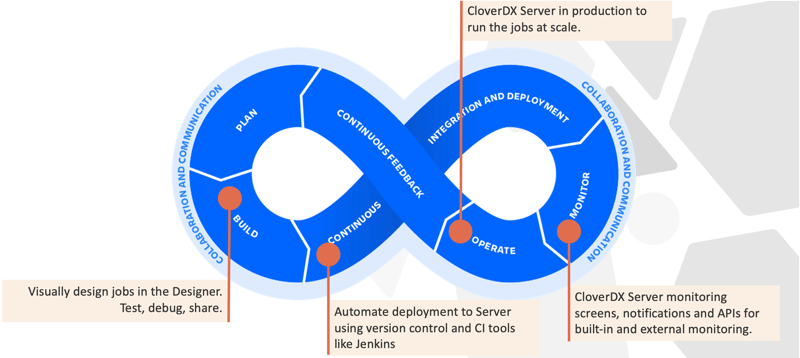Businesses are awash with information, collecting vast amounts of data on everything from customer buying habits to manufacturing processes and supply chains.
And yet, despite investments in increasing data analytics maturity, projects continue to fail. Indeed according to Gartner as many as 85 percent of all big data projects misfire.
This is where DataOps can help.
At its heart, DataOps blends DevOps, Agile development, and statistical process controls. It offers a holistic approach to data management, bringing engineers, analysts, and other professionals under the same umbrella. With its focus on efficiency, automation, and continuous improvement, DataOps can help you to speed up processes, improve data quality, and derive more business value from your data.
What is DataOps? The Essential IntroductionIt can also increase collaboration between your teams, which is what we’ll be exploring today.
What is the DataOps manifesto and how can it boost collaboration?
The DataOps manifesto consists of 18 key principles, spanning both technical and operational practices.
Key to this manifesto is the concept of collaboration. So if you’re looking to bring your teams together, we recommend focusing on the following principles:
1. Embrace change
Data, by its very nature, is constantly changing. That means that in order for your business to extract as much value out of it as possible, your people need to be flexible too. They need to embrace change and lean into it. So that ultimately they can break down the silos that have traditionally held their data projects back.
2. It’s a team sport
Communication is key to the DataOps manifesto. It relies heavily on teams not just working together, but talking to one another. There’s no single person responsible for DataOps; instead, you should source diverse, innovative ideas from team members across your organization.
DataOps bridges the divide between those who collect your data, those who analyze it, and those who put it into action. It can also help to break down silos, enabling people from different aspects of your organization to better understand one another’s data needs in order to extract maximum business value.
3. Simplicity
Data organization can be overwhelmingly complex. In larger organizations, data teams may work on 50 different projects at any one time, while decentralized units work on their own unique projects.
These individual teams may use different processes, tools, and platforms. Sometimes these can even differ from project to project. Without proper alignment or standardization, your disparate data can quickly descend into a mess of black-box processes. What may have begun as a single, auditable source of truth is fragmented, impacting your ability to make agile decisions.
To avoid these issues, the DataOps manifesto recommends simplification and standardization. You can achieve this by using templates, playbooks, or simply recycling processes and code that you’ve previously built. This helps to create a common language that boosts collaboration and decision-making.
Building bridges with DataOps
The future success of your organization relies on its ability to harness data effectively. And it’s here where the true value of DataOps lies.
Just as DevOps changed the face of software, so too can DataOps change the course of your analytics. Driven by people, not technology, the principles laid out in its manifesto are designed to focus your existing systems through communication, integration, and collaboration. It’s not a quick fix. Instead, it’s a process of transformation; one that will break down communication barriers and allow you to unlock the true potential of your data.
CloverDX: collaboration in action
CloverDX can help you move towards a DataOps approach. The CloverDX platform speeds up development and and iteration, simplifies collaboration, and embeds automation into your data processes.
Deploy data projects faster
CloverDX helps you move more quickly to deploy data projects, with a visual interface and ability to share and re-use components that helps you build faster, data quality tools to help automate testing and integration with CI/CD tools for automated deployment. CloverDX’s focus on automation also helps speed up data projects, and eliminate the errors that come from human intervention.
Collaborate better
CloverDX also makes communication between business and IT teams easier - a shared, visual platform helps bridge the gap between technical and non-technical teams. And with the Data Catalog functionality, IT teams can make data more easily available to business users, in a format they can use, making it easier for everyone to collaborate on data.
The simplification principle is helped by having one place for all your organizations data processes. CloverDX brings centralization and standadization to your data operations, which also helps bring transparency and make collaboration easier across the business.Why CloverDX should be part of your DataOps toolkit
Modernizing and automating data processes
Our work with leading finance consultants, Ortec Finance, showcases just how powerful embracing change and modernizing data processes can be.
Previously, Ortec Finance consultants spent several days every quarter preparing complex investment reports for their clients. It was labor-intensive, opaque, and prone to errors. Not to mention, the process caused a lot of stress.
Using the CloverDX platform, Ortec Finance replaced manual processes with streamlined, automated workflows. This removed the need for days of manual work every quarter, and enabled the small team to cover a lot of ground, freeing up time to open up markets and capitalize on new opportunities.
"It's really the click of a button and we run the system. Instead of having typically a 4 or 5 day process of people preparing the data, running the models, checking the results and building the reports to send to the clients, we’ve reduced that to half a day or less.”
- Thomas Hage, Senior Consultant, Ortec Finance
Read more: How Ortec Finance reduced repetitive manual data processes by up to 90% with CloverDX
If you’d like to learn more about how CloverDX can help your organization with its DataOps approach, reach out to our team today.










